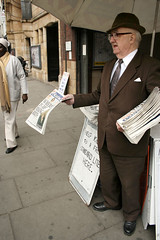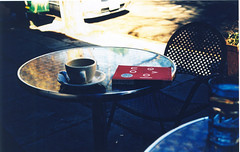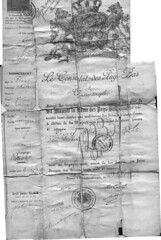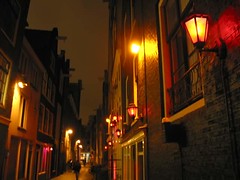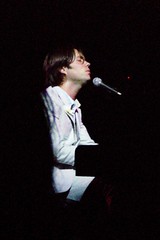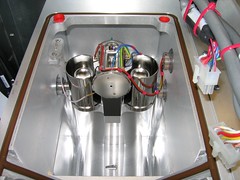Thursday, April 28, 2005
Latest or last issues?
The owner of the News Corporation Rupert Murdoch gave a speech a few weeks ago shocking many of his colleagues. Murdoch - who owns for instance the British sensation tabloid The Sun and "slightly" republican FOX News - said to a hall filled with editors and publishers that it is time that printed media starts taking new media more seriously and changing its working methods in towards dialogue and discussion. As The Economist pointed out, it wasn´t as much what he said but who said it. When Murdoch says that they start investing in new forms of media, that means big bucks - or pounds.
I read yesterday an interesting essay from The American Press Institute on participatory journalism. They claim that work of journalists changes radically when everyone is able to publish with low or no costs. They mention trends like journalists who use blogs for getting comments on their article drafts or who publish the entire interview in the Internet.
The most radical enthusiasts have been claiming for years the death of journalism and the profession of journalists. I would say that it´s the wrong judgement. What the We Media essay from The American Press Institute points out rather well, the work of a journalist changes into a facilitator. The work does not end when the article is published. This must be a scary line of thought for several journalists and media houses. That you have to face the reader via more intense communication than nowadays. I just find it exciting. A good journalist in this world is one bringing interesting views to the public sphere, making comments about the state we´re in and creating a synthesis from the chaos and gigantic amount of information. Cool.
Wednesday, April 27, 2005
Socially alone
I enjoy spending time alone in places filled with people. I like the sound of several overlapping discussions where it is starting to be difficult to hear what people are talking about. I often feel that it is even easier to concentrate when there´s noise. I have problems concentrating in silence because I start listening to every single squeek or crack.
I spent yesterday evening at de Balie reading a memo on participatory media. I love combining a cup of coffee or a glass of wine, nice surroundings and thought-provoking text. As Jonathan Franzen stated it, be reading you learn to be alone.
I ended my evening with Sydney Pollack´s The Interpreter. A bit silly but good entertainment. And I have always been a fan of the United Nations so a film shot inside the headquarters works for me. And let´s face it, Nicole Kidman does not make mistakes. She is close to perfection.
Tuesday, April 26, 2005
Do you have The Papers with you?
It´s odd that although you know that it is more or less a formality for European Union citizens, you still stress about it. I didn´t believe my colleagues who said that the client card is enough to prove that I have a health insurance. I called several times to the insurance company and forced them to fax me it in paper. A paper that I finally did not need at the Office.
Well, the whole procedure took approximately 10 minutes. I paid a bit less than 30 euros, showed my client card and got a new sticker for my passport. Now the Ministry of Justice is handling my application. The woman started laughing when I said in the end that this procedure was rather painless.
The sense of humbleness is probably quite normal when interacting with the government. There is always the thought in your mind that although the procedure is a formality, they have the power to say no.
So, if everything goes as it should, I should have my Dutch identity card in a month or so. We´ll see.
Monday, April 25, 2005
Mainstream sin tourism
A friend of mine has been here for a few weeks writing a travel guide of Amsterdam for Mondo magazine. That has also meant that I have been looking at the city in a slightly different manner.
As my friend Antti said, you have to write about Amsterdam in a different way because there are no tourist attractions like the Eiffel tower or Big Ben. It is the package.
I was yesterday at the opening of the annual exhibition of the World Press Photo at the Oude Kerk which is in the middle of the Red Light District. When having a pre-drink with a colleague of mine Igor we witnessed the mainstream tourism in Amsterdam. It is slightly tipsy people dropping their beer glasses from the terrace table, losing their balance while walking on the streets, communicating by shouting and walking around the Red Light District with van Gogh Museum plastic bags. This is an odd city. Most of the tourists come here to see the sins: coffee shops, prostitution, bars etc. Odd, odd, odd.
As a local you start ignoring this. You notice it when you get used to the sweet smell of cannabis or choosing your routes and cafes outside the very touristic areas. And the reaction of most of the people living here to all these sins is - boredom. Amsterdam-based people start quite often yawning when people begin talking about joints and prostitutes. Didn´t see that happening in Helsinki.
Wednesday, April 20, 2005
Media for the sake of media
Therefore I read with great interest a recent pamphlet from the think tank Demos that was written by the Secretary of State for Culture, Media and Sport Tessa Jowell. She writes about public value and public responsibility.
The essay is really worth reading. If you are able to tolerate the New Labour tone in it (freedom to choose, personalisation), you can also find really interesting thoughts in it. She writes rather well about the need to support public spaces. Although her public space is a safe and civilised one (compared to the one by Hannah Arendt that stresses conflict), she still makes an important contribution for the struggle in favour of public support for culture, citizenship projects and public debate.
What strikes me in the essay is that does not stress the possibilities of new media when is comes to debate and community-building. I personally find the concept of social media highly worth investing and exploring. Projects like Geheugen van Oost show that a medium can serve also other purposes than informing.
Tuesday, April 19, 2005
The Genius has left the country
He is not easy in the sense that his lyrics are rather complex, he goes from one style to another like a person who can not make his mind. He reminds me a bit of Italo Calvino who proves with his novel If On A Winter´s Night A Traveller that he can master nearly every style of fiction-writing that exists. Rufus Wainwright´s Want Two leaves the listener with slightly the same feeling when he goes from folk to opera and back.
Rufus´ concert was rather surprising all the way to the end. It started with Agnus Dei in Latin and ended with encores performed wearing only strings and striped socks or a bathrobe. I did not see that coming.
The best thing in him and his music is the fact that he is sincere and genuine. He talks about his family, love and homosexuality very openly. Worth listening whatever your preference is. In any issue. He has been often compared to Jeff Buckley if that tells something. I am ashamed to admit that it didn´t tell anything to me. For me the best thing is the sincerity. But as I was told in a meeting today:"Well, isn´t Wainwright a bit like Antony and the Johnsons of yesterday?" Well, black is the new black and Helsinki is the new Oslo that was the new Reykjavik. Or whatever.
Monday, April 18, 2005
Need to share alone
Returned last night from Budapest. I have been rather critical in the past on Lufthansa but all that is now history. They saved me last night. Although they serve only meat and have uncomfortable leather seats, they guaranteed that I got home. And that is what I pay for. My flight from Budapest was delayed which meant that I missed my connecting flight to Amsterdam. With German efficiency they flew me to Dusseldorf and helped me to get home - by taxi. Wunderbar I would say. Thumbs up.
One of the best things of travelling is being alone and having time for yourself. I read more when travelling than I would read when I am busy with daily routines.
Again, I have to boost a book. Jonathan Franzen is a genius. A journalist friend of mine Ville recommended last year that I would read his book, The Corrections, but I never did. Well, a few weeks back I bought his collection of essays called How To Be Alone. When I started I found it difficult to stop. Addictive and witty.
I reminds me a bit of my favourite author at the moment, Dave Eggers (his short story collection How We Are Hungry should be read by all those who adore wit). But when Eggers goes personal and stays rather private, Franzen writes about the big picture. He is one of the best analysts of our time I have read for months.
Rather many of the essays are about reading. He analyses why and what people read and do not read. He quotes Professor Shirley Brice Heath from Stanford who has tried to find reasons for reading. She finds two:
1. habit of reading has been heavily modeled in childhood
2. social isolates who use reading to build communities with the authors.
Franzen writes:"But the first thing reading teaches is how to be alone."
I can relate to that. Books and reading bring me comfort. They make me smile. They make me understand. They help me broaden my scope.
The other key feature of Franzen is his superb way of analysing the relationship between private and public sphere. He is disgusted by Kenneth Starr´s Clinton investigation as something where private forces itself into areas where it does not belong. He states by using examples from media and sex industry that it is not the private sphere that is hidden or threatened, it is the public sphere.
I will end with a quote from his short story Imperial Bedroom:"A genuine public space is a place where every citizen is welcome to be present and where the purely private is excluded or restricted."
Friday, April 15, 2005
On identity
Something really peculiar happened yesterday. I was heading back to my hotel and stopped at a kiosk. The woman behind the counter did not speak English. She asked me:"Finnish?" I still do not understand how. Today I have been amusing myself by spying on Finnish tourists who do not realise that I am Finnish.
I would not say that living abroad bring out the Finn in me. But when I interact daily with people from different countries, it happens automatically that I start defining my Finnishness more. Well, it is the basic sociological theory that the other is needed for an identity to develop, fourish and exist.
Wednesday, April 13, 2005
Who owns it really?
We continued the discussion on democracy and citizenship. It is very clear that these new attempts for increased sharing would also give more rights to the authors and less to lawyers. This could also give several young or alternative artists more possibilities to get their work seen.
This discussion is happening on several arenas. However, the politicians and civil servants are not actively taking part in the discussion. I saw yesterday in the Finnish tv news that Finnish record companies are going to file law suits against peer-to-peer sharing. And the parliament is helping in this with a stricter copyright law.
Of course the copyright issue is not a black-and-white issue. I understand the concerns of the book publishers and record companies to some extent. But the core principle of the Creative Commons is really easy to accept: giving more rights to the authors and making the copyright system more transparent. A classical example of the CC movement is Jack White from The White Stripes who gave the right to sample their music to an alternative artist.
Tuesday, April 12, 2005
Life is easier when you do not understand
- how series of numbers could change into images?
- how boats float?
- how cars work?
- how is it possible that when I push F9 on my iBook, all the windows transform into a minimal size?
- how I can hear somebody´s voice on the phone?
Yes, to be very clear: I do not understand science. But I am rather happy with this ignorance. I enjoy the fact that there is still technology that amazes me. And I love the feeling of incapacity to understand several things. I have no idea what could be achieved so I have decided that everything must be possible.
Sunday, April 10, 2005
Heroes, leaders and such
There has been a slight pause in blogging due to work trips and acting as a travel guide. My sister, her husband and my uncle visited Amsterdam which was super. We ate well and walked around the city. And also went to a way too fancy restaurant and awkwardly walked out after seeing the menu consisting mostly of oysters, had dinner in an Indonesian restaurant where they play jazz (Coffee and Jazz on Utrechtsestraat) and so on. The weather was awful but that happens.
I actually found from Flickr a picture that shows the location of their hotel. It was just in the beginning of canal Singel, on the right side of the church in the picture.
The picture gives a good lead to my other subject. I mean the biggest piece of news of the week. Of course, the death of the Pope.
As a Lutheran (a non-practising one as most Finns) I found it slightly difficult to understand what happened. I have always been in awe when I have seen on television the masses that gather to the Vatican. But the amounts of people during the last week were something completely else.
For me the most puzzling thing is the content. John Paul II has been described mostly as a humble man. I think I have to address this issue with some Catholic friend of mine. I would not see Finns grieving over the death of the Archbishop in the same way. What is the relationship of the religion, the church and Pope as its leader? Some commentaries have said that the death means an end of an era. But the end of what? Although the pope as the leader of the church is of huge importance, a religion can not depend on one man.
I do not mean to sound disrespectful. Not at all. I am just wondering innocently. Social scientists have been saying for years that personification and medialisation are main features of our time. But when it comes to religion, I would say that the relationship and role is more troublesome. Or at least is should be.
But maybe it is the Lutheran society where I come from that makes me wonder. I mean that the Lutheran church at least for me has always been a church where religion and faith are something private and personally owed. In that sense the role of the religious leaders is more strongly a role of a advisor than leader. I really have to address this issue with someone Catholic.
Wednesday, April 06, 2005
Do you speak my language, do I speak yours?
I have to say that the studies of rhetorics are a big help in this process. I have realised lately that the subjective nature of language is very strongly stuck on me. We give different meanings to the same words and different words to the same meanings. I would not say confusing, I would say interesting. In my work I am like a messenger for instance between bureaucrats and journalists or artists and possible funders. It means that when to the other audience one has to say that there is a clear need for a critical evaluation, to the others the same meaning would be communicated better by saying that there might be a problem.
I enjoy this tremendously. I keeps the mind active and reminds of the power structures loaded in every single sentence.
I have also enjoyed it tremendously that during the last years there have been signs of rebirth when it comes to the public interest in language and grammar. The popularity of Lynne Truss´ Eats, Shoots & Leaves is a clear example of this (although I have to say that I find the language and argumentation of the book slightly poor) shows this quite clearly. When it comes to politics and language I would highly recommend Norman Fairclough´s New Labour, New Language where he analyses the language of Tony Blair and manages to explain very simply the differences in what is said and what is meant.
And of course there are different levels when it comes to interest in linguistic tricks. I am fully aware that quite many of my relatives still find it difficult to understand that someone can get a Master´s Thesis by analysing the use of the word citizen in information society policy documents. I did.
Tuesday, April 05, 2005
Who really likes fitness?
Just one thing I have to confess: I find going to the gym a drag. Or to be more precise, ultimately boring. I don´t get it. Are there really people who do not get bored when swinging hands and feet to different directions in that cross-trainer thingie? I am bored, approximately after three minutes.
Well, as they sing on the soundtrack of Studio 54 on my iPod: I found a cure. Reading. I realised yesterday that I have to read and time just flies. Although I realised that reading The Economist or De Groene Amsterdammer is a bit like Bonfire of Vanities meets cultural elitism, it seems to be the only way I survive there. And to be honest, isn´t it rather practical that yesterday on the cross-trainer I learned new things about the doubts concerning using computers for mathematical proofs or about the marketing paradigms of future mobile technology. Could do worse.
Monday, April 04, 2005
Go, TV, go!
In the Netherlands my ultimate TV day is Sunday. It was rather special already when it consisted of the politicall incorrect Ali G in the USA, the fabulously moving Six feet under and my long-time favourite West Wing. But yesterday topped it all. I saw The Kumars at No. 42 for the first time.
Hilarious is not enough to describe it. I was laughing out loud. The Kumars are an Indian family living in London who built a tv studio to their backyard. It is absolutely super. Maybe part of the dialogue explains why. The son Sanjeev hosts a new talk show (in the backyard studio) and they had the actor Richard E. Grant as a guest. While Sanjeev is interviewing, the rest of the family (mom, dad and granny) sit on the sofa. Yesterday the father Ashwin interrupted the interview. The dialogue went as follows:
Ashwin: Mr Grant, it is true that you are from Swaziland, right?
Grant: Yes.
Ashwin: I just realised one thing. We are both immigrants and we are both succesful.
Grant (laughing): Yes.
Ashwin: But to most of the people in Britain we are just two black persons.
Ab. Fab. Super. More of this. Don´t ask me to leave my apartment on Sunday evenings. Unless you have a television.
Sunday, April 03, 2005
What's on your mind?
There's not much similar in my life and in the life of a British neurosurgeon in his late forties. Still I found it easy to relate to thye constant nervousness described beautifully by McEwan. My weekend has been an absolutely brilliant one starting with a day off and the opening of the Radiodays on Friday, continuing with a heavily extended brunch on the sunny terrace of Vertigo and a party of a Rietveld academy students on Saturday and ending with a sunny and relaxed Sunday of cycling and reading. Near to perfection if you ask me. Still when I rewind back to the topics covered in discussions or trounling my mind, they are not the typical chit-chat ones: British identity, protestant values, Dutch society and islam, need for a European dialogue, rhetorics, feminism, artificial intelligence, comparisons between different fields of science etc.
By brunch companion said - he clarified that it was a compliment - that I am not very good in traditional small talk. "Your small talk is about issues", he commented. I guess so. I realised afterwards that I do not make that big differences between the issues that are traditionally seen as serious or as fun. I started wondering whether it is the same as with Henry Perowne on Saturday. He constantly analyses the people he meets through his medical expertise. Shock and horror, I do the same but only through social science. It seems that the eight years at university left some marks in me.
When living in Amsterdam, I have noticed that I have loads more time for reading. I have also noticed that I am a social reader. With this I mean that I like reading in cafés on sitting on a park bench. I need the noise in order to be able to concentrate. I read Saturday among other places on the terrace of Het Blauwe Theehuis in Vondelpark, at the Coffee Company in De Pijp and on the roof of the science museum Nemo. I finished the book this evening at eight. The sun was going down and during the last 10 pages I struggled with myself whether I should put my coat on or just keep on reading the final pages. Amsterdam looked so amazingly beautiful from the roof of Nemo.
As the book ended with Henry Perowne finally reaching the end of his dramatic Saturday, I felt really peaceful and relaxed. I walked down from the roof and cycled home which is just around the corner. I realised that I felt so good because of the weekend that I was smiling all the way. I was sort of cycling in my own happy bubble through the crowded centre. Even the usually disturbingly loud English tourists on my home street didn't irritate me. This is how all weekends should end.
